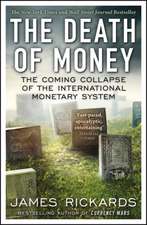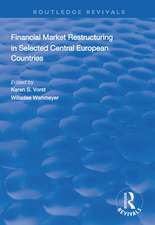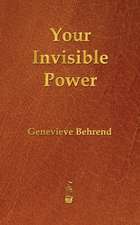The Science of Getting Rich
Autor Wallace D. Wattlesen Limba Engleză Paperback – 2 mar 2015
Preț: 60.26 lei
Nou
Puncte Express: 90
Preț estimativ în valută:
11.53€ • 12.07$ • 9.60£
11.53€ • 12.07$ • 9.60£
Carte tipărită la comandă
Livrare economică 31 martie-14 aprilie
Preluare comenzi: 021 569.72.76
Specificații
ISBN-13: 9781633847668
ISBN-10: 1633847667
Pagini: 66
Dimensiuni: 152 x 229 x 5 mm
Greutate: 0.1 kg
Editura: Sublime Books
ISBN-10: 1633847667
Pagini: 66
Dimensiuni: 152 x 229 x 5 mm
Greutate: 0.1 kg
Editura: Sublime Books
Notă biografică
Wallace Delois Wattles (1860-1911) was an American New Thought writer. He remains personally somewhat obscure, but his writing has been widely quoted and remains in print in the New Thought and self-help movements. As a Midwesterner, Wattles traveled to Chicago, where several leading New Thought leaders were located, among them Emma Curtis Hopkins and William Walker Atkinson, and he gave "Sunday night lectures" in Indiana; however, his primary publisher was Massachusetts-based Elizabeth Towne. He studied the writings of Georg Wilhelm Friedrich Hegel and Ralph Waldo Emerson and recommended the study of their books to his readers who wished to understand what he characterized as "the monistic theory of the cosmos."
Through his personal study and experimentation Wattles claimed to have discovered the truth of New Thought principles and put them into practice in his own life. He also advocated the then-popular health theories of "The Great Masticator" Horace Fletcher as well as the "No-Breakfast Plan" of Edward Hooker Dewey, which he claimed to have applied to his own life. He wrote books outlining these principles and practices, giving them titles that described their content, such as Health Through New Thought and Fasting and The Science of Being Great. His daughter Florence recalled that "he lived every page" of his books. A practical author, Wattles encouraged his readers to test his theories on themselves rather than take his word as an authority, and he claimed to have tested his methods on himself and others before publishing them.
Through his personal study and experimentation Wattles claimed to have discovered the truth of New Thought principles and put them into practice in his own life. He also advocated the then-popular health theories of "The Great Masticator" Horace Fletcher as well as the "No-Breakfast Plan" of Edward Hooker Dewey, which he claimed to have applied to his own life. He wrote books outlining these principles and practices, giving them titles that described their content, such as Health Through New Thought and Fasting and The Science of Being Great. His daughter Florence recalled that "he lived every page" of his books. A practical author, Wattles encouraged his readers to test his theories on themselves rather than take his word as an authority, and he claimed to have tested his methods on himself and others before publishing them.
Extras
from Chapter 1
The Right to be Rich
Whatever may be said in praise of poverty, the fact remains that it is not possible to live a really complete or successful life unless one is rich. No person can rise to his greatest possible height in talent or soul development unless he has plenty of money. In order to unfold the soul and to develop talent he must have many things to use, and he cannot have these things unless he has money to buy them with.
People develop in mind, soul, and body by making use of things, and society is so organized that people must have money in order to become the possessor of things. Therefore, the basis of all human advancement must be the science of getting rich.
The object of all life is development. Everything that lives has an inalienable right to all the development it is capable of attaining.
A person’s right to life means his right to have the free and unrestricted use of all the things which may be necessary to his fullest mental, spiritual, and physical unfolding—in other words, his right to be rich.
In this book, I shall not speak of riches in a figurative way. To be really rich does not mean to be satisfied or contented with a little. No person ought to be satisfied with a little if he is capable of using and enjoying more. The purpose of nature is the advancement and development of life. Every individual should have all that can contribute to the power, elegance, beauty, and richness of life.
The person who owns all he wants for the living of all the life he is capable of living is rich. Nobody can have all he wants without plenty of money. Life has advanced so far and become so complex that even the most ordinary man or woman requires a great amount of wealth in order to live in a manner that even approaches completeness. Every person naturally wants to become all that he is capable of becoming; this desire to realize innate possibilities is inherent in human nature. Success in life is becoming what you want to be. You can become what you want to be only by making use of things, and you can have the free use of things only as you become rich enough to buy them. Therefore, an understanding of the science of getting rich is the most essential of all knowledge.
There is nothing wrong in wanting to get rich. The desire for riches is really the desire for a richer, fuller, and more abundant life. And, that desire is praiseworthy. The person who does not desire to live more abundantly is uncommon. And the individual who does not desire to have money enough to buy all he wants may not be living to his full potential.
There are three motives for which we live: we live for the body, the mind, and the soul. No one of these is better or holier than the other. Each is desirable, and neither body, mind, or soul can live fully if one of the others is cut short of full life and expression. It is not right or noble to live only for the soul and deny mind or body. It is wrong to live for the intellect and deny body and soul.
We are all acquainted with the loathsome consequences of living for the body and denying both mind and soul. We see that real life means the complete expression of all that a person can give forth through body, mind, and soul. No person can be really happy or satisfied unless his body is living fully in every function and unless the same is true of his mind and his soul. Wherever there is an unexpressed possibility or an unperformed function, there is an unsatisfied desire. Desire is possibility seeking expression or function seeking performance.
A person cannot live fully in body without good food, comfortable clothing, warm shelter, and freedom from excessive toil. Rest and recreation are also necessary to his physical life. He cannot live fully in mind without books and time to study them, without opportunity for travel and observation, or without intellectual companionship. To live fully in mind he must have intellectual recreations and must surround himself with all the objects of art and beauty he is capable of using and appreciating.
To live fully in soul, an individual must have love. And the expression of love is often frustrated by poverty.= An individual’s highest happiness is found in the bestowal of benefits on those he loves. Love finds its most natural and spontaneous expression in giving. The person who has nothing to give cannot fill his place as a husband or father, as a citizen, or as a human being. It is in the use of material things, that a person finds full life for his body, develops his mind, and unfolds his soul. It is therefore of supreme importance to be rich.
It is perfectly right that you should desire to be rich. If you are a normal man or woman you cannot help doing so. It is perfectly right that you should give your best attention to the science of getting rich because it is the noblest and most necessary of all studies. If you neglect this study, you are derelict in your duty to yourself, to God, and to humanity. You can render God and humanity no greater service than to make the most of yourself.
Cuprins
Publisher’s Preface
Introduction
1. The Right to be Rich
2. There is a Science of Getting Rich
3. Is Opportunity Monopolized?
4. The First Principle in the Science of Getting Rich
5. Increasing Life
6. How Riches Come to You
7. Gratitude
8. Thinking in the Certain Way
9. How to Use the Will
10. Further Use of the Will
11. Acting in the Certain Way
12. Efficient Action
13. Getting Into the Right Business
14. The Impression of Increase
15. The Advancing Man
16. Some Cautions and Concluding Observations
17. A Summary of the Science of Getting Rich
Questions
Introduction
1. The Right to be Rich
2. There is a Science of Getting Rich
3. Is Opportunity Monopolized?
4. The First Principle in the Science of Getting Rich
5. Increasing Life
6. How Riches Come to You
7. Gratitude
8. Thinking in the Certain Way
9. How to Use the Will
10. Further Use of the Will
11. Acting in the Certain Way
12. Efficient Action
13. Getting Into the Right Business
14. The Impression of Increase
15. The Advancing Man
16. Some Cautions and Concluding Observations
17. A Summary of the Science of Getting Rich
Questions
Recenzii
“Wattles offers techniques for getting in tune with one’s deeper self and thus creating a channel of communication between oneself and universal energy. His is a gentle philosophy that excludes competition, cheating, and lording it over one’s fellows when one has made it, and encourages cooperation.”
"If you watched The Secret and wondered what the little book was that changed author Rhonda Byrne's life, this is it. Originally published in 1910, its time has come."
"Perhaps the most important thing that separates Wattles' success strategy from many other systems is his emphasis on spiritual philosophy rather than self interest."
". . . Wattles identified financial success as the critical element, and first priority, in creating an environment in which one could grow in wealth, wisdom, and happiness. . . . the foundation of today's widespread success and prosperity movements."
"If you watched The Secret and wondered what the little book was that changed author Rhonda Byrne's life, this is it. Originally published in 1910, its time has come."
"Perhaps the most important thing that separates Wattles' success strategy from many other systems is his emphasis on spiritual philosophy rather than self interest."
". . . Wattles identified financial success as the critical element, and first priority, in creating an environment in which one could grow in wealth, wisdom, and happiness. . . . the foundation of today's widespread success and prosperity movements."
Descriere
Descriere de la o altă ediție sau format:
The 100-year-old book that inspired Rhonda Byrnes bestseller "The Secret" shows how economic and emotional security can be achieved in practical, imaginative, and noncompetitive ways by following a set of positive principles.
The 100-year-old book that inspired Rhonda Byrnes bestseller "The Secret" shows how economic and emotional security can be achieved in practical, imaginative, and noncompetitive ways by following a set of positive principles.
Textul de pe ultima copertă
BUSINESS / SELF-HELP " Wattles offers techniques for getting in tune with one' s deeper self and thus creating a channel of communication between oneself and universal energy. His is a gentle philosophy that excludes competition, cheating, and lording it over one' s fellows when one has made it, and encourages cooperation." --Publisher' s Weekly In his bestselling book, Wallace D. Wattles explains that " universal mind" underlies and permeates all creation. Through the process of visualization, we can engage the law of attraction--impressing our thoughts upon " formless substance" and bringing the desired object or circumstances into material form. The author emphasizes the critical importance of attitude: only by aligning ourselves with the positive forces of natural law can we gain unlimited access to the creative mind and its abundant rewards.The Science of Getting Rich holds the secret to how economic and emotional security can be achieved in a practical, imaginative, and noncompetitive way, while maintaining a loving and harmonious relationship with all of life. By living in accordance with the positive principles outlined in this book, we can find our rightful place in the cosmic scheme and create for ourselves an environment in which to grow in wealth, wisdom, and happiness.WALLACE DELOIS WATTLES (1860-1911) was the author of numerous books, the best known of which is The Science of Getting Rich. He experienced failure after failure in his early life until after many years of study and experimentation he formulated a set of principles that, with scientific precision, create financial and spiritual wealth. He died a prosperousman in 1911.





















